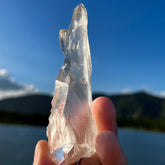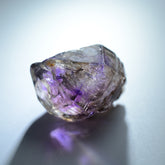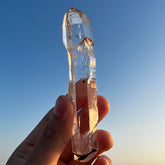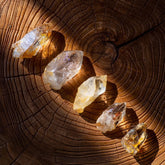Amethyst stones are valued for their alleged healing and spiritual qualities, as well as their beautiful violet colors. It's important to clean amethyst regularly, whether it's used for meditation, energy work, or simply as a lovely item. Over time, gemstones may become energetically cluttered or pick up negative energy, which can impair their potency and effectiveness. By cleaning your amethyst, you may restore its natural vitality and maintain its beautiful alignment with your passions.
What Is Amethyst Crystal?

For generations, amethyst, a magnificent purple form of quartz, has been prized for its ethereal essence and breathtaking appearance. "Amethystos" is derived from the Greek word for "not intoxicated." The stone was thought by ancient cultures to improve mental clarity and avoid intoxication. With hues ranging from light lavender to deep violet, amethyst is frequently utilized in jewelry, home décor, and magical rituals.
Aside from its appealing name, amethyst is known to be a powerful gem for healing. It is commonly linked to the crown and third eye chakras, as well as to calmness, self-assurance, and spiritual development. Amethyst is valued for its capacity to calm the mind, improve intuition, and foster tranquility. You can wear it as jewelry, put it in your room, or utilize it while you meditate.
Ways to Cleans Amethyst Crystals

Way 1: Cleansing Amethyst with Soil
Burying your amethyst in soil could be a good way to replenish its energy. In other words, put the jewel in the ground for a full day, either in your garden or in a container filled with natural soil. Your precious jewel receives pure, anchoring vibrations from the soil, which absorbs any toxic or inert life force. Just make sure to check the area and then use a gentle cloth to clean the gemstone.
Way 2: Cleansing Amethyst with Fire
Fire could stand for transformation and purification. To purify amethyst, you can pass it over incense (like sandalwood or frankincense) or over the smoke of a lit candle instead of burning it with fire. Your stone can be recharged and negative energy removed due to the life of the flame. Keep the gem in a safe place to prevent harm.
Way 3: Cleansing Amethyst with Water
Often used to remove colorful stains, water is a common cleanser. Hold your amethyst under flowing water for a few minutes; spring water or natural sources such as streams are best, but tap water will work in an emergency. Be cautious: avoid using this method if your amethyst is raw or delicate, since it may be harmed by extended exposure to water.
Way 4: Cleansing Amethyst with Sage
Applying sage to gemstones is one of the most common ways to clean them. For 30 to 2 minutes, let the smoke surround your amethyst after lighting a bundle of sage. As the sacred smoke surrounds the crystal, it eliminates stale energy and brings it back to its natural frequency. You can also add other purifying herbs, such as palo santo, if you would like.
Way 5: Cleansing Amethyst with Moonlight
The soft energy of the moon is adored by amethyst. During a full moon, set your gemstone outside or on a windowsill to capture the moonlight all night long. This method is particularly safe and efficient because moonlight will not harm the stone. It gives your amethyst a calm, feminine vitality and strengthens its natural abilities.
Way 6: Cleansing Amethyst with Other Crystals
It is commonly known that certain gemstones, including selenite and pure quartz, can purify other stones. In essence, set your amethyst next to or on top of a larger cleansing gemstone for a few hours. This approach is ideal if you like a high-vibe, low-effort mindset. It is safe, gentle, and you can actually do it while you unwind.
Precautions During Amethyst Crystals Cleanings

Even though amethyst is usually solid, cleaning still requires careful handling. Here are some crucial measures to take to guarantee that your gemstone remains secure and functional:
-
Avoid using harsh cleansers or chemicals
When cleaning your amethyst, never use soaps or other cleaning supplies. These may cause its surface to become darker and alter its optical characteristics.
-
Use Water Cautiously
While amethyst can withstand brief exposure to water, prolonged soaking can impair its structure, especially for rough or clustered forms. Dry it continuously with a gentle cloth until it dries fully.
-
Limit Daylight Displays
Amethyst can fade if exposed to direct sunlight for an extended period of time, even though sunshine can polish gemstones. Follow moonlight for a kinder, safer charging experience. Amethyst should not be exposed to flames or extremely hot conditions. Never put it in or close to a fire while utilizing fire for active cleaning; instead, pass it through smoke.
-
Utilize clean soil
Make sure your gemstone is free of fertilizer and pesticides if you choose to bury it in the ground. Additionally, make sure to stamp the spot to ensure that you do not lose your amethyst.
Locations Where Amethyst is Found Globally

Brazil
Brazil is the main producer of amethyst. Magnificent deep purple gemstones are produced in the Rio Grande do Sul region and are frequently found in enormous geodes found in basalt rocks.
America
America Combined Several U.S. states, such as Arizona, Colorado, and North Carolina, are home to amethyst. Georgia and Thunder Cove, Maine, are also well-known for their stores, though on a smaller scale.
Uruguay
Uruguay produces premium-grade amethyst, which can have a deeper, more complex hue than Brazilian amethysts. The intense violet tones of Artigas' location diamonds make them extremely sought after.
Zambia
Zambia has the potential to become one of Africa's main suppliers of amethyst because of its remarkable purity and bluish-purple colors. Zambian amethyst is frequently considered to be among the greatest in the world.
Russia
Russia Amethyst is mostly found in Russia's Ural Mountains. These stones have a strong reputation that stretches back to the Czarist era and are usually darker.
China
With most of its mines in Sichuan and Inner Mongolia, China has emerged as a growing amethyst supplier. Despite differences in number and quality, the production is always expanding.
Conclusion
In conclusion, cleaning your amethyst is one simple but effective method to maintain its brightness and beauty. By using common cleansing methods like moonlight showering, smudging, or sound, you can ensure that your gemstone stays a clear, effective instrument for healing and spiritual connection. If you trust your instincts and use a method that suits you, your amethyst will keep leading you along the way.
FAQs Section
Which countries produce the most Amethyst?
The world's leading producers of amethyst are Russia, Zambia, Uruguay, and Brazil.
Where are amethysts found?
Alluvial deposits, geodes, and volcanic rocks in nations including Brazil, Uruguay, Zambia, Russia, the US, and China are home to amethysts.
Where is amethyst found in Brazil?
Mainly in basaltic geodes, especially in the regions of Minas Gerais and Rio Grande do Sul.
Where can I find Amethyst in Russia?
The Ural Mountains have indeed produced deep purple, high-quality amethysts.
Which countries produce lilac Amethyst?
Depending on the mine, lavender or light-colored amethysts are frequently found in Brazil, Zambia, and occasionally China and Uruguay.
How old are amethysts?
The majority of amethyst gemstones are millions of years old, having formed over 100 million years ago during ancient volcanic activity.
























